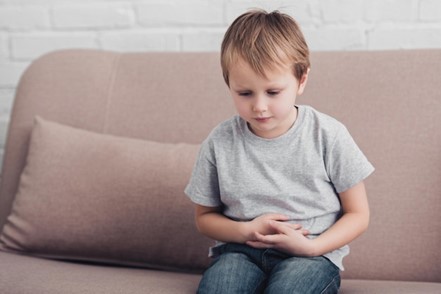It is characterized by frequent, loose, or watery stools that occur more frequently than usual for an individual. In children, it often signals infections like gastroenteritis, food intolerances, or gastrointestinal disorders. Proper hydration is crucial to manage diarrhea, especially in young children who are more vulnerable to dehydration. Consulting a doctor is important for accurate diagnosis and treatment, particularly if symptoms persist or worsen.
Symptoms
- Loose, watery stools occurring more frequently than usual
- Abdominal cramps or pain
- Nausea and vomiting
- Fever
- Dehydration, indicated by dry mouth, decreased urination, lethargy, or sunken eyes.
Causes
Children commonly get diarrhea from infections like viruses (rotavirus, norovirus), bacteria (Salmonella, E. coli), or parasites (Giardia). Other causes include lactose intolerance, food intolerances, medications, contaminated food or water, and sudden dietary changes. Chronic conditions like inflammatory bowel disease (IBD) or irritable bowel syndrome (IBS) can also be underlying factors. Identifying the cause is crucial for effective treatment and management.
Diagnosis
Stool tests may be done to identify specific pathogens (bacteria, viruses, parasites) causing diarrhoea. Blood tests or imaging may be necessary in severe or persistent diarrhoea cases to rule out underlying conditions.
Treatment:
- Fluid replacement: Oral rehydration solutions (ORS) are crucial to replace lost fluids and electrolytes. Severe cases may require intravenous fluids.
- Dietary adjustments: Gradually reintroducing a normal diet after symptoms improve. Avoid irritating foods or substances that may worsen diarrhoea.
- Medications: Antidiarrheal medications are used under medical supervision in certain cases, though they are not recommended for young children or in cases of infectious diarrhoea
Prevention
- Regular handwashing
- Ensuring food is properly cooked and stored and drinking safe, clean water.
- Immunization against rotavirus is the most common cause of severe diarrhoea in children.
When to Seek Medical Help
- Persistent diarrhoea lasting more than a few days.
- Signs of dehydration (dry mouth, reduced urination, lethargy).
- Blood in stools or high fever.
Diarrhoea in children is a common condition that can often be managed effectively with proper hydration, appropriate nutrition, and, in some cases, medical intervention. Early recognition of symptoms, prompt treatment, and preventive measures such as good hygiene practices are crucial in reducing the impact of diarrhoea on children's health and well-being. Seeking timely medical advice can further aid in managing severe cases and preventing complications associated with this condition.





